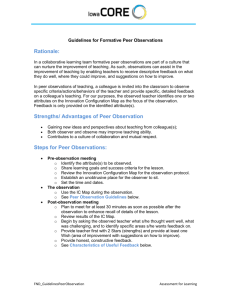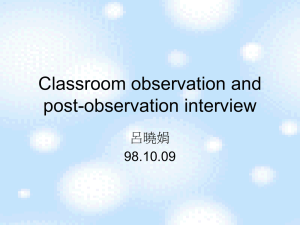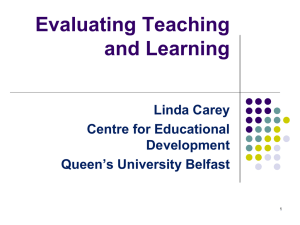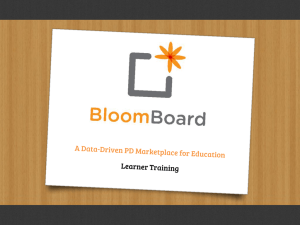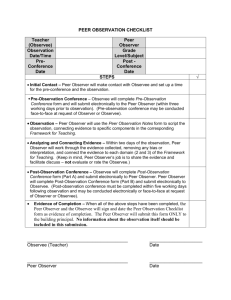AQH-A13 Peer Observation of Teaching
advertisement
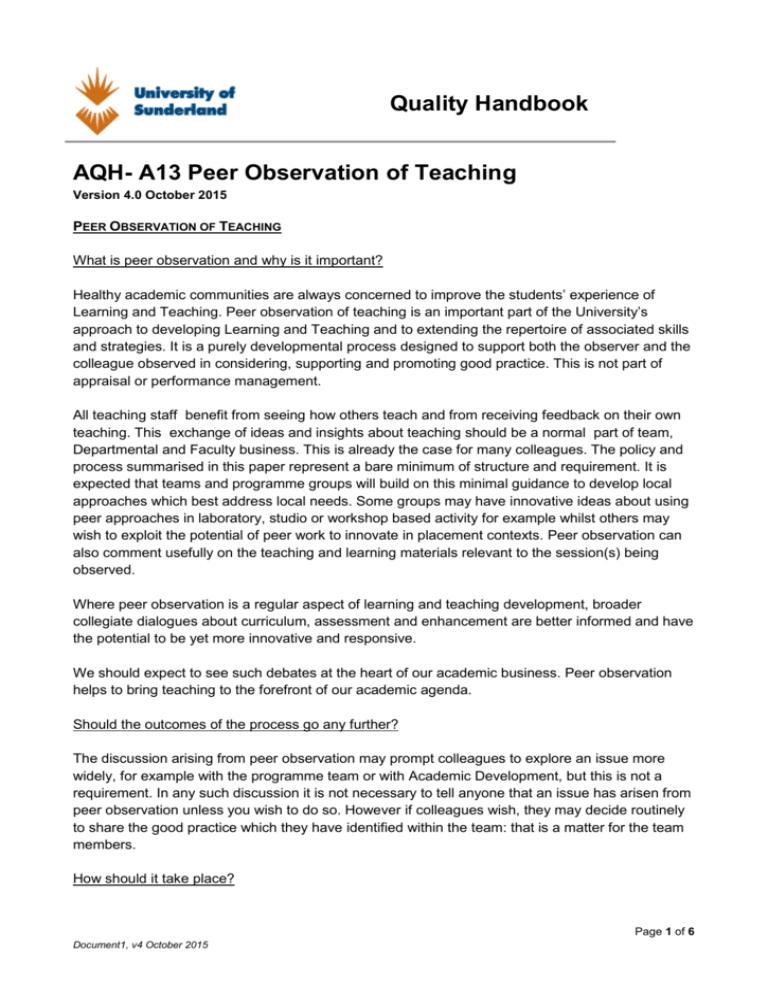
Quality Handbook AQH- A13 Peer Observation of Teaching Version 4.0 October 2015 PEER OBSERVATION OF TEACHING What is peer observation and why is it important? Healthy academic communities are always concerned to improve the students’ experience of Learning and Teaching. Peer observation of teaching is an important part of the University’s approach to developing Learning and Teaching and to extending the repertoire of associated skills and strategies. It is a purely developmental process designed to support both the observer and the colleague observed in considering, supporting and promoting good practice. This is not part of appraisal or performance management. All teaching staff benefit from seeing how others teach and from receiving feedback on their own teaching. This exchange of ideas and insights about teaching should be a normal part of team, Departmental and Faculty business. This is already the case for many colleagues. The policy and process summarised in this paper represent a bare minimum of structure and requirement. It is expected that teams and programme groups will build on this minimal guidance to develop local approaches which best address local needs. Some groups may have innovative ideas about using peer approaches in laboratory, studio or workshop based activity for example whilst others may wish to exploit the potential of peer work to innovate in placement contexts. Peer observation can also comment usefully on the teaching and learning materials relevant to the session(s) being observed. Where peer observation is a regular aspect of learning and teaching development, broader collegiate dialogues about curriculum, assessment and enhancement are better informed and have the potential to be yet more innovative and responsive. We should expect to see such debates at the heart of our academic business. Peer observation helps to bring teaching to the forefront of our academic agenda. Should the outcomes of the process go any further? The discussion arising from peer observation may prompt colleagues to explore an issue more widely, for example with the programme team or with Academic Development, but this is not a requirement. In any such discussion it is not necessary to tell anyone that an issue has arisen from peer observation unless you wish to do so. However if colleagues wish, they may decide routinely to share the good practice which they have identified within the team: that is a matter for the team members. How should it take place? Page 1 of 6 Document1, v4 October 2015 1. Staff should be ‘paired’ on the basis that they can learn from and share with each other. That means that they should both feel comfortable with their ‘partner’. However it is often productive to consider pairing people with colleagues with whom they do not normally interact (eg not someone with whom they team teach) so that you get a different perspective from one which you would get in the normal course of events. Good practice includes pairing more and less experienced staff, pairing someone who would like to develop a teaching method (eg use of the Virtual Learning Environment (VLE)) with someone who has particular experience in that area and so on. It can even be useful to pair someone with a colleague from a different subject area because this can focus the discussion on the teaching process rather than the content. It is also important to change pairs from time to time so that you get a range of perspectives both as observer and as observee. 2. Faculties should agree how to manage the ‘pairing’ – whether at faculty or departmental or team level. 3. Observations should be annual at least if they are to be truly developmental. If the colleagues wish they may undertake more observations (eg to cover a lecture and the follow-up seminar or to work on a development arising from the first observation). The colleagues concerned should agree the session to be observed. Before the observation they should find time to prepare each other. This could include explaining what the module is about and how the session concerned fits into the module. It should include providing the observer with access to relevant learning resources including the module handbook or equivalent, relevant parts of the reading list and anything specific to the teaching session being observed. You may wish to identify any particular issues pertaining to that particular teaching group for example. 4. During the session the observer may wish to use the guidance material provided but this is not a requirement and if used it remains confidential to the people concerned. You may wish to use the guidance material as a prompt to your own thoughts but not ‘fill it in’. if you want any support or further guidance this can be provided by Academic Development. 5. After the session the two colleagues should discuss how it went, what good practice was observed and what could be developed further. 6. The arrangement may be reciprocal so that the observer in one session becomes the observee in another. What should be recorded? Unless the participants choose otherwise there is no need to record what was discussed. The benefit is in the process of talking through the session. However as peer observation is an important part of developing learning and teaching the Faculty should keep a record of the observation cycle and ensure that all relevant colleagues are involved. Each Faculty should decide who will maintain the record and who will monitor the observation cycle. What about part-time staff, Academic Tutors (ATs) and postgraduates doing teaching? As their teaching affects the student experience and everyone can benefit from discussing their teaching, this process should apply to everyone who teaches. It excludes ‘guest lecturers’ and equivalent. Staff who are part-time should be involved in the process pro rata to their contracted hours, so that someone who is on one-third time will be observed (and observe) every three years, someone who Page 2 of 6 Document1, v4 October 2015 is half time every 2 years and so on. However everyone should be observed at least every three years (so someone on a one-tenth contract will be observed, and observe, every three years). They may however opt to be observed (and observe) more frequently. Postgraduate research students should be observed every year for the first three years as part of their overall skills development. Colleagues who are being observed as part of other professional development (eg those new to the profession and taking the Postgraduate Certificate in Learning and Teaching) do not need to be observed in addition to that, provided that that process is at least as frequent as the one described here. Attachment: peer observation guidance material VERSION HISTORY Version Occasion of Change Original placed in Academic Quality Handbook Annual review of quality handbook Change author A. Roberts Date of modification March 2012 Modifications made A Carlton August 2013 Clarification of acronyms 3.0 Review S Sutcliffe 4.0 QMSC S BoothMalone November 2014 October 2015 Name change for Head of Academic Development Learning materials changed to learning resources 1.0 2.0 Page 3 of 6 Document1, v4 October 2015 Peer Observation of Teaching – guidance material It is not a requirement that this form be used. It is however available if those involved find it useful. There are some general guidance notes at the end of the form. This form may be used in whole or in part at the discretion of the observer and observee to support peer observation. If used it may be kept by the observee as a record of the discussion or it may be used to facilitate discussion and then destroyed. Alternatively it may be used by the observer as a prompt to thoughts which will inform the discussion afterwards but not be formally filled in. In that case it should be destroyed after the discussion. It should not be kept by the observer or passed on to anyone else. If you choose to use the form in full, Part 1 should be completed by the teacher whose session is being observed before the start of the session. The observer should complete Part 2, and Part 3 should be completed by the teacher and the observer together following the session. Part 1 Teacher observed: Observer: Faculty & department / subject area / team: Faculty & department / subject area / team: Session observed (title, module, programme[s], level): Session type (lecture, seminar etc.) Date of session: Number of students registered: Session outline – learning outcomes and/or main aims and activities including a note of the relevant learning resources: Specific development requests from teacher to be observed (if any): Any additional comments from teacher to be observed (if any): Page 4 of 6 Document1, v4 October 2015 Part 2 Observer’s comments on (as applicable): Session organisation and planning: Session content and relation to learning outcomes: Teaching methods: Interactions with students: Suggestions for development including responses to any specific development requests: Good practice which the observer intends to adopt him/herself or which merit wider dissemination – eg across the programme team: Any other comments: Part 3 Further thoughts and suggestions resulting from the post-session discussion Page 5 of 6 Document1, v4 October 2015 Guidance notes During the observation Observers should arrive with the lecturer and choose a position which allows them to watch unobtrusively. Observers should not participate in the session. After the observation Feedback should be framed constructively and be based on specific points which were observed. It is important to tell the observee what went well, including things which were handled well despite a difficult situation, and to note their strengths. Suggestions for development or improvement should be made sensitively; any differences in the interpretation of an aspect of the session should be explored. Try to give constructive and practical suggestions rather than focussing on ‘what went wrong’. Try to look at issues which the observee is able to change, for example, where the physical environment in which the session took place has caused difficulties, discuss ways of managing these even if the solution is not perfect. Further help If you would like help or advice about peer observation or to pick up any issues raised in the discussion please contact Sarah Graham, the Head of Academic Development in Academic Services, and any examples of good practice which you think deserves a wider audience. You do not need to mention (unless you wish to do so) that any issues you raise have arisen from peer observation. Page 6 of 6 Document1, v4 October 2015
